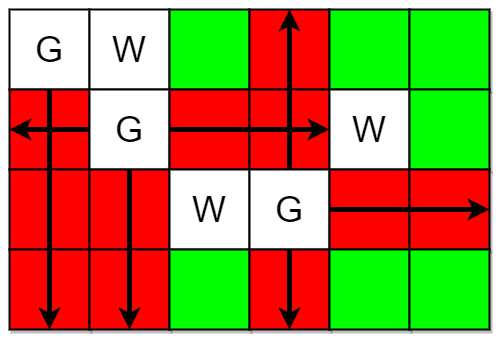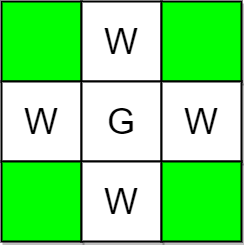2257. Count Unguarded Cells in the Grid
Description
You are given two integers m and n representing a 0-indexed m x n grid. You are also given two 2D integer arrays guards and walls where guards[i] = [rowi, coli] and walls[j] = [rowj, colj] represent the positions of the ith guard and jth wall respectively.
A guard can see every cell in the four cardinal directions (north, east, south, or west) starting from their position unless obstructed by a wall or another guard. A cell is guarded if there is at least one guard that can see it.
Return the number of unoccupied cells that are not guarded.
Example 1:

Input: m = 4, n = 6, guards = [[0,0],[1,1],[2,3]], walls = [[0,1],[2,2],[1,4]] Output: 7 Explanation: The guarded and unguarded cells are shown in red and green respectively in the above diagram. There are a total of 7 unguarded cells, so we return 7.
Example 2:

Input: m = 3, n = 3, guards = [[1,1]], walls = [[0,1],[1,0],[2,1],[1,2]] Output: 4 Explanation: The unguarded cells are shown in green in the above diagram. There are a total of 4 unguarded cells, so we return 4.
Constraints:
1 <= m, n <= 1052 <= m * n <= 1051 <= guards.length, walls.length <= 5 * 1042 <= guards.length + walls.length <= m * nguards[i].length == walls[j].length == 20 <= rowi, rowj < m0 <= coli, colj < n- All the positions in
guardsandwallsare unique.
Solutions
Solution: Simulation
- Time complexity: O(mn)
- Space complexity: O(mn)
JavaScript
js
/**
* @param {number} m
* @param {number} n
* @param {number[][]} guards
* @param {number[][]} walls
* @return {number}
*/
const countUnguarded = function (m, n, guards, walls) {
const cells = Array.from({ length: m }, () => Array.from({ length: n }, () => false));
let result = m * n - guards.length - walls.length;
for (const [row, col] of guards) {
cells[row][col] = 'G';
}
for (const [row, col] of walls) {
cells[row][col] = 'W';
}
const checkGuarded = (row, col, isGuarded) => {
const cell = cells[row][col];
if (cell === 'G' || cell === 'W') {
return cell === 'G';
}
if (isGuarded && !cell) {
cells[row][col] = true;
result -= 1;
}
return isGuarded;
};
for (let row = 0; row < m; row++) {
let isGuarded = false;
for (let col = 0; col < n; col++) {
isGuarded = checkGuarded(row, col, isGuarded);
}
isGuarded = false;
for (let col = n - 1; col >= 0; col--) {
isGuarded = checkGuarded(row, col, isGuarded);
}
}
for (let col = 0; col < n; col++) {
let isGuarded = false;
for (let row = 0; row < m; row++) {
isGuarded = checkGuarded(row, col, isGuarded);
}
isGuarded = false;
for (let row = m - 1; row >= 0; row--) {
isGuarded = checkGuarded(row, col, isGuarded);
}
}
return result;
};